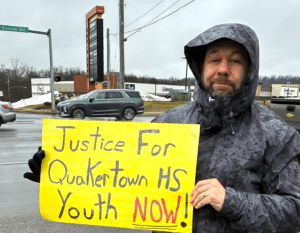The “big, beautiful bill” that just passed the House and now awaits President Trump’s signature has public school board directors, educators and those in local government positions sounding the alarm about harm to kids and significant impacts to educational programs, staffing and services.
“There is no way that Pennsylvania or any other state can backfill the loss of billions in federal funding included in this bill. Hundreds of thousands of Pennsylvanians will go hungry. Even more will lose their health care and not be able to see a doctor when they get sick,” said Aaron Chapin, the president of the Pennsylvania State Education Association. “On top of that, public schools will lose funding they now receive through Medicaid to provide health-related services to students, and billions will be diverted from public education to fund an unaccountable private school voucher program.”
Indeed, this Republican budget will be felt in school districts across the commonwealth.
“The impacts of this bill will be disastrous for our school budgets. I am concerned that these cuts will cause new gaps for our students,” said Bill Senavaitis, PSEA Mideastern Region president.
Uncertainty around federal and state dollars to counties and local public school districts have called staffing, programs and student services – including school food services meals – into question.
“In addition to these cuts to health, nutrition and postsecondary education access, this bill also diverts billions in federal funding to unaccountable private and religious school vouchers, something that 61% of Pennsylvanians oppose, according to a recent poll,” Senavaitis said.
The bill calls for adding $3.3 trillion to the federal deficit, $4.5 trillion tax breaks and steep spending cuts to social programs over the next decade for programs like Medicaid, health care, SNAP, clean energy, among others.
According to the PSEA, impacts from the House budget reconciliation bill include:
- At least $625 billion in cuts to Medicaid, threatening health care coverage for 10.9 million Americans over the next 10 years.
- $300 billion in benefit cuts due to narrowed eligibility requirements for the Supplemental Nutrition Assistance Program, known as SNAP.
- Limits to student access to higher education.
- A voucher program that funnels $20 billion in public funds to private schools over four years.
Bucks County’s Local Educational Agency (LEA) reports federal funding data for the 1st Congressional District, which includes all of Bucks County and a portion of Montgomery County from 2022-23. It is currently represented by Republican Brian Fitzpatrick. Fitzpatrick voted against the budget bill Thursday after previously voting for it.
Across Pennsylvania’s 1st Congressional District, public school districts received about 7.1% of their revenue from the federal government; though the percentage of food services support was a whopping 54%.
Here’s a snapshot of federal funding to support food services programs in local school districts. The report was provided by PSEA for 2022-23, the most recent data available:
- In Quakertown, food services funding is about 63%, while in neighboring Pennridge it amounted to about 39%.
- Morrisville Borough received federal funding of 95%.
- Bristol Borough received 84%.
- Central Bucks received about 35%, while its nearest neighbor Centennial received about 54% of its food services funding from federal funds.
Food services and federal funds currently “flow through” the U.S. Department of Agriculture, PSEA representatives said. Food service revenue is “likely to be impacted by SNAP/Medicaid enrollment. The data includes Souderton Area and North Penn school districts as well as the Montgomery County Intermediate Unit #23, PSEA said.
“Cutting access to food will hurt children. Period. It will widen the gap in equity and achievement. It will shift the burden onto parents already stretched thin, onto teachers who dig into their own pockets to buy snacks for their students and onto schools that were never meant to carry this weight alone,” said Jacqueline Weiswasser, a school counselor at Valley Elementary School in the Bensalem School District and a member of the Bensalem Township Education Association.
These grants are part of the $1 billion in funding awarded under the 2022 Bipartisan Safer Communities Act that was passed by Congress following the deadly school shooting in Uvalde, Texas. President Trump cancelled these grants in May, casting doubt on how districts will fund mental health professionals.
Weiswasser said the Care Solace program implemented in Bensalem and paid for with federal grants provides faster, appropriate resource matches for students with mental health professionals and therapists to support their social, emotional and academic challenges.
“Cuts to school food budgets would remove stability and dignity around a basic human need. Food is not a privilege, it’s a necessity. When we take that away from children, we don’t just harm their health, we rob them of the chance to learn, focus and grow.” – Jeannie Guerra, Bensalem High School teacher
She said “awesome things for our families” were possible because of the grant funding, which included paying for a new training curriculum. The new curriculum caters to younger students with social and emotional challenges.
“We’ve seen an improvement. Without the funding we would not be able to continue that program,” Weiswasser said.
Fears over cuts to Medicaid and SNAP could trigger a “dangerous domino effect, not just for families who currently rely on these benefits, but for many others who depend on federally-funded school programs as well,” she explained.
READ: Trump Administration Withholds Over $6 Billion for After-school, Summer Programs and More
In Bensalem, every student has access to free breakfast and lunch – regardless of income. That is possible thanks to a combination of federal funding, targeted grants, and programs like Brighter Bites, a fresh fruits, vegetables and healthy food choices program.
“If these services are cut, or even reduced, the impact could be devastating. We’re not just talking about meals. We’re talking about stability. We’re talking about students who can focus in class because they’re not hungry or thinking about where their next meal” is coming from, explained Jeannie Guerra, a special education reading teacher at Bensalem High School and second vice president for the Bensalem Township Education Association. She said many of her students didn’t have to worry about where their next meal is coming from, thanks to Bensalem’s food services practices and programs.
“Cuts to school food budgets would remove stability and dignity around a basic human need. Food is not a privilege, it’s a necessity. When we take that away from children, we don’t just harm their health, we rob them of the chance to learn, focus and grow,” Guerra added.






